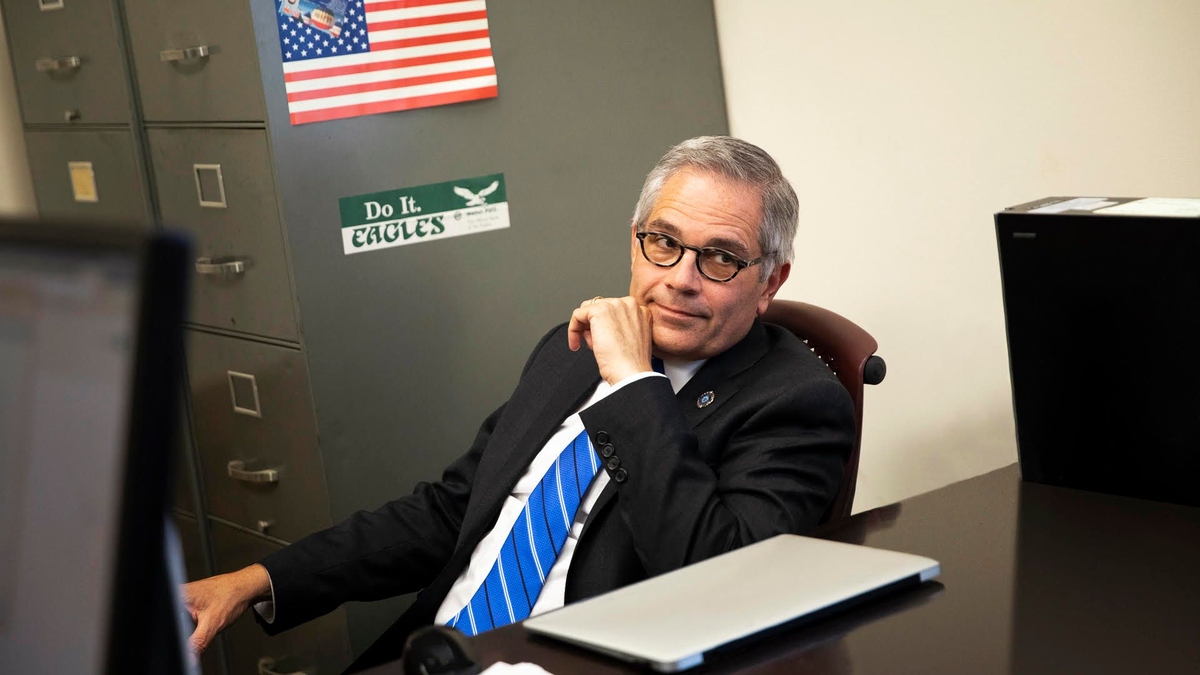
To say that longtime civil rights attorney Larry Krasner was a long shot to become the very head of the agency that had been his most despised nemesis is an understatement. As one skeptical progressive puts it in in Ted Passon, Yoni Brook and Nicole Salazar’s riveting, eight-episode docuseries, Philly D.A. (Prods.: Nicole Salazar, Josh Penn, Michael Gottwald; Exec. Prod.: Dawn Porter), he had about as much of a chance as David Duke taking the reins of the ACLU. And yet not only did Krasner win his election campaign back in 2017, he did so in a landslide. And that’s when the real drama began.
To overhaul the system that had resulted in Philadelphia attaining one of the highest incarceration rates among big cities in America, Krasner would have to navigate an endless series of landmines. This includes the entrenched bureaucrats who had once seen themselves as positive change-makers, but were now viewed as obstacles; and the veteran police officers whom Krasner had spent decades alienating and now had to find a way to work with. And then there’s the mostly BIPOC community that brought Krasner to office but aren’t necessarily supportive of every one of his forward-thinking ideas—like locating a supervised injection site in their underserved backyard.
Lucky for us, the intrepid Philly D.A. team is there with a camera every step of the way, following along as the newly installed prosecutor is forced to trade in his rhetorical bulldozer for some less flashy carrots and sticks. And Documentary is likewise fortunate that the dedicated DA found time in his busy schedule to fill us in on everything from shying away from the spotlight, to setting ground rules, to taking hard knocks in front of the lens.
DOCUMENTARY: Allowing a doc crew to follow you around—especially so early on in your tenure—seems like a potentially risky move. So why did you even agree to participate in the project? How did the filmmakers gain your trust?
LARRY KRASNER: I took a chance when I ran for office, and our national movement for criminal justice reform took a chance on me. We won—so why not take a chance on a documentary that could spread our movement for criminal justice reform, which may be the greatest civil rights movement of our time?
Any great movement is a daily grind for people inside it, in the fight. Every day is gritty. People need to see that struggle to know that they can take back government and make it work for them.
People need to know that victory is possible, that change is possible, if ordinary people just push ahead day after day.
D: Though you’ve been in the spotlight for most of your career, you often seem rather guarded in front of the lens. Did prior interactions with the media inform your relationship to the camera, or was this long-form documentary experience inherently different?
LK: I was guarded. I’m not the point. The work is the point, not my feelings or my prior life. I wanted the doc to be reality, not a reality show.
D: Several scenes end with you closing the door on the crew before some highly sensitive meetings. So what ground rules were set for filming? What exactly was off-limits to the camera?
LK: Rules? Victims and survivors of crimes don’t get used. Investigations don’t get compromised. Legal requirements, like those around juvenile privacy and grand jury secrecy, are real. Coworkers’ issues don’t get exposed in order to entertain. Progress comes first.
D: ”The challenge is for me not to be me," you admit in what I felt was one of the most revealing episodes of the series, showing you at your most vulnerable as you navigate the unfamiliar politics of the job. You’ve come to this realization that now that you have the “booming voice” of the government, your well-honed confrontational style has become almost a liability. So was this episode difficult to watch? Are there other scenes you find hard to view? And conversely, which scenes are you especially pleased for the public to now see?
LK: I don’t find any scenes especially pleasing or difficult. I’m okay with all of it, including my and our weaknesses and mistakes. We are trying to be fair, to use power with restraint, and we are imperfect. We won’t always agree and we won’t always get it right. I know that. But at least we are trying to be fair, which requires reflection and adjustment and learning from failure to do better next time. That’s good enough for me.
D: Did you learn anything in particular from participating in this multi-year project—or perhaps from watching the finished series?
LK: I learned to take chances, yet again. The episodes brought things back. They reminded me to enjoy every day in the good fight, no matter how brutal the pushback or how hard the work. And to appreciate my colleagues, their selflessness and their talent.
Philly D.A., an IDA Enterprise Documentary Fund grantee, begins airing April 20 on PBS’ Independent Lens.
Lauren Wissot is a film critic and journalist, filmmaker and programmer, and a contributing editor at both Filmmaker magazine and Documentary magazine. She's served as the director of programming at the Hot Springs Documentary Film Festival and the Santa Fe Independent Film Festival, and has written for Salon, Bitch, The Rumpus and Hammer to Nail.




